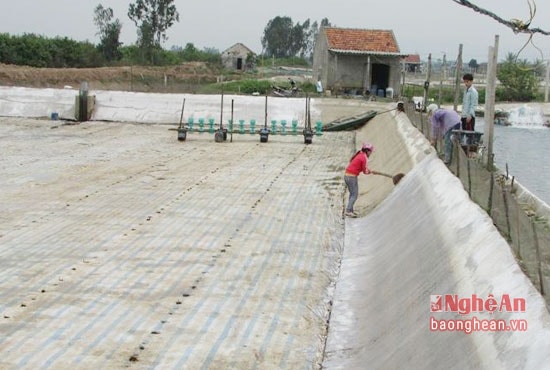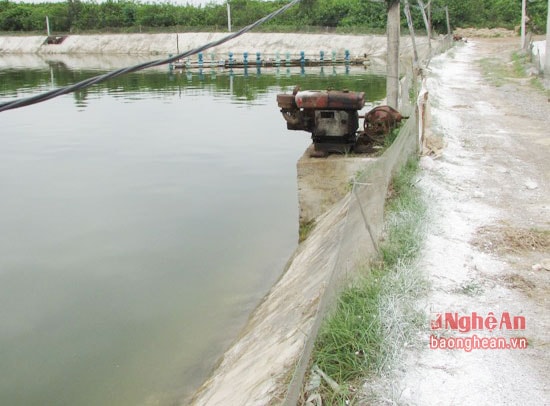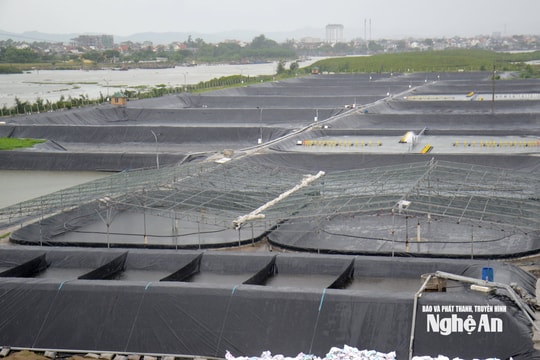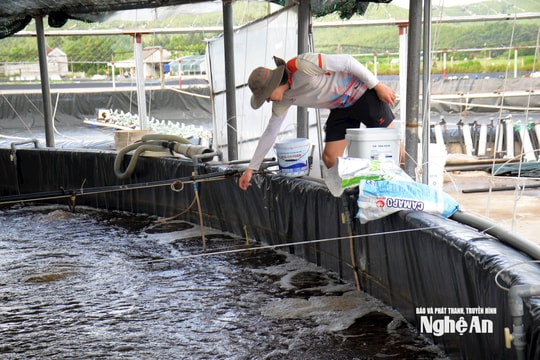Quynh Luu: Nearly 5 hectares of shrimp infected with white spot and hepatopancreas disease
(Baonghean.vn) - The first crop of shrimp has been released for less than a month, but currently some ponds in Quynh Bang and Quynh Yen communes (Quynh Luu) have been affected by diseases and have died en masse.
Currently, Quynh Bang commune has released 80% of the shrimp farming area, and it is expected that by the end of May, the commune will complete the first shrimp farming. However, after a short time of releasing shrimp into the pond, Quynh Bang commune had nearly 2.5 hectares infected with the disease, concentrated in Loc Thuy Cooperative and Trinh Mon Aquaculture Company. All areas of shrimp infected with the disease were lost, causing great losses to farmers.
 |
| Mr. Thai Ba Tam's family in Quynh Bang commune is cleaning the pond to prepare for the next farming season. |
Mr. Thai Ba Tam's family in Hoc Van hamlet, Quynh Bang commune has 2 shrimp ponds with an area of 5,400 m2 in the industrial shrimp farming area of Quynh Bang commune. After treating the ponds, in mid-March he released over 300,000 CP Quang Binh shrimp. When the shrimp were only 28 days old, a pond with an area of 1,900 m2There were dead shrimp floating on the water surface here and there. A few days later, the shrimp started to die in large numbers, causing damage to Mr. Tam's family of more than 50 million VND.
Immediately after the disease appeared, Mr. Tam reported to the local authorities and households in the farming area to strengthen disease prevention measures. At the same time, dead shrimp were collected and the water source was treated with chemicals before being discharged into the environment.
Mr. Thai Ba Tam said: “My family’s shrimp pond started to get sick on April 15. Because the shrimp were still young, their resistance was still weak, leading to their rapid death. Currently, my family is focusing on overcoming the consequences, cleaning the pond, disinfecting, and drying the pond. After about 25 days to 1 month of treatment, my family will treat it again and add water to continue farming.”
 |
| Households in Quynh Bang commune spread lime powder on shrimp farming roads to prevent epidemics. |
After the authorities took samples for testing, they determined that the cause of the shrimp deaths was white spot disease. This is a dangerous disease with complex developments, shrimp often die quickly and there is currently no effective medicine or treatment. Thus, in recent years, Quynh Bang commune has always had shrimp disease outbreaks, causing losses to farmers.
The main reason is due to weather factors, moreover, according to the process, the ponds take water from Mai Giang river to settle the pond for about 10 days, then put it into the pond, but some households only stocked the ponds after 3-5 days. In addition, the ponds discharge wastewater into the environment without complying with regulations, which has significantly affected the shrimp farming process.
Up to now, the entire Quynh Luu district has 4.9 hectares of shrimp infected with white spot and hepatopancreas disease. To prevent widespread spread, immediately after detecting the disease, the Quynh Luu district veterinary station coordinated with the district agricultural department to send staff to the grassroots to monitor the area and control the epidemic; at the same time, propagate to people not to directly discharge infected pond water into the environment, must immediately treat with chlorine at the dosage prescribed by the province, to limit the development of the disease.
In addition, strictly manage production and trading facilities for aquatic breeds, food, and biological products, closely control and guide people to handle dead shrimp according to the correct process to avoid potential disease outbreaks.
Mr. Ho Vinh Quang - Officer in charge of aquaculture at the Quynh Luu District Veterinary Station said: "White spot disease often appears during the transitional weather between winter and summer. This disease is difficult to treat and cannot be cured if people do not proactively report it but arbitrarily discharge water, it will spread to other areas.
The station also informed the communes to set up inspection teams, when an epidemic occurs, provide medicine for treatment, propagate to people to raise awareness about disease prevention, and limit release during the transitional period between March and April."
Red Face
Quynh Luu Station


.jpg)





